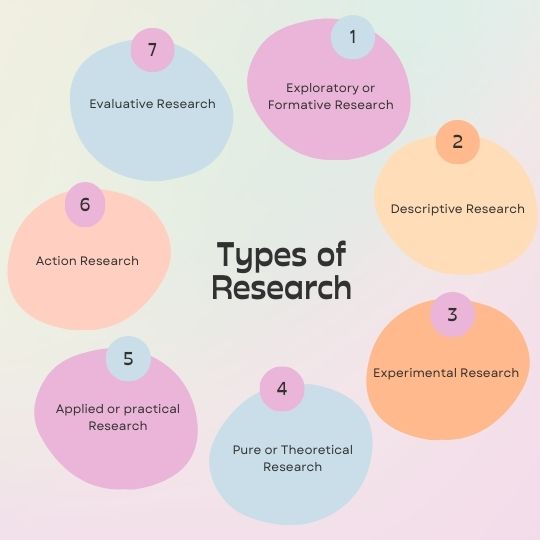Introduction to Research: Types of Research
In this article we will go through the topic Research: Types of Research.
What is Research?
Research is the process of systematically exploring, investigating, and analyzing information to gain new insights, solve problems, or answer questions. It involves gathering data, evaluating evidence, and drawing conclusions to expand knowledge and understanding in a particular field or topic.
Types of Research
The research work in social science or in management is inspired by the objectives. What do we want to achieve by undertaking particular study? It is a very pertinent question which determines the direction and the dimensions of a particular research Programme. There are different types of research studies which aim at achieving the respective goals. Different methodology is used for different type of research in order to meet the requirements of particular objectives. For the sake clarity as well as brevity it would be quite appropriate to categorize research in following types:
- Exploratory or Formative Research
2. Descriptive Research
3. Experimental Research
4. Pure or Theoretical Research
5. Applied or practical Research
6. Action Research
7. Evaluative Research
1. Exploratory or Formative Research
This type of research aims at gaining experience on the basis of which a definite plan of research is made and hypothesis is developed for conducting further research. It is an attempt at preparing design or outline on a subject for conducting a scientific study. The area covered under the exploratory research is such about which no information is available currently. As no research has been undertaken so far on the subject under study so a beginning is made with this study only. This is why it is called formative research; it can also be called preparatory research. Besides building hypothesis this type of research is also used for developing new hypotheses exploring or identifying new areas of study and giving definite shape and direction to the research Programme. Exploratory research also helps in understanding the causes of a problem and the cause-effect relationship among the factors
Following are the important steps for conducting Exploratory Research:
(i) Study of related literature
(ii) Survey of the Sources
(iii) Selection of respondents
(iv) Preparation of Questionnaire
(v) Analysis of Stimulating cases and events.
2. Descriptive Research
The main aim of descriptive research is to make proper and logical description of the subject or the problem under study by collecting true realistic and reliable material. It has observed that the process of scientific investigation in fact begins with the description of events, only after description the material can be classified and analyzed. Thus, under this type of research the events concerning individuals, groups, society, community, culture, traditions etc. are dealt with and described on the basis of age, sex, education, profession and other characteristics. The study of the census report and the votes of people on a particular issue are covered under such research the facts and information are collected by observation interview and questionnaire the description is made on the basis of what is of an event in this type of research work as the title itself suggests the study is descriptive and not prescriptive.
Following are the important steps for conducting Descriptive Research
(i) Explanation of Objectives
(iii) Selection of Samples
(ii) Selection of Techniques
(iv) Collection of data
(v) Classification and analysis of data
(vi) Report writing
3. Experimental Research
The experimental research is such an investigation which is carried out under controlled conditions. Experiment is an important aspect of this type of research. By experiment here we mean observation under controlled conditions. Jahoda has stated that in a simple meaning experiment can be taken as the method of organizing the activity of data collection from which conclusions can be drawn about the relevance of a hypothesis. In other words, experimental research is the process of testing the authenticity and reliability of the hypothesis. In such a study, empirical facts are collected and the cause-effect relationship among them is established. Having studied various factors and their cause-effect relationship under controlled conditions, finally, a scientific theory cart be built.
Following are the important steps for conducting Experimental Research
- Identify research question or hypothesis.
2. Review existing literature.
3. Define variables: independent, dependent, and control.
4. Design experiment, detailing procedures.
5. Select participants, ensuring representativeness.
6. Obtain ethical approval, if necessary.
7. Conduct experiment, manipulating variables and collecting data.
8. Analyze data using appropriate statistical techniques.
9. Interpret results in relation to research question.
10. Draw conclusions based on findings.
11. Report results in a research report or publication.
12. Reflect on process and consider adjustments for future research.
4. Pure Research
Goode and Hat have classified social research into two categories- Pure or Theoretical research and Practical research. We will first discuss about pure research here. This type of research is conducted for expanding the knowledge and formulation of theories. Through this research the concepts are built, rebuilt, crystallized explained and established. Pure research is also called fundamental research.
Meaning and Definition of Pure Research
As per National Science Institute of America, Pure or fundamental research deals with basic issues. It does not attempt at finding solution to the problems of an organization or establishment. This is meant mainly for development of knowledge.
Following are the important steps for conducting Pure Research
1. Formulate clear research question or hypothesis.
2. Review existing theoretical literature.
3. Develop conceptual framework outlining key concepts.
4. Define variables and constructs for theoretical analysis.
5. Choose appropriate research methodology.
6. Collect relevant data from scholarly sources.
7. Analyze data using theoretical frameworks.
8. Synthesize findings to develop new insights.
9. Evaluate validity and reliability of analysis.
10. Draw conclusions based on theoretical analysis.
11. Communicate results through academic channels.
12. Seek peer feedback and revise as necessary.
Research: Types of Research
5. Applied Research
Applied research is another important method of research which paves the way and provides bases for developing social sciences. It makes a rich contribution to the society by providing solution to the social problems. Goode and Hatt have stated that applied research provides great help in dealing with and solving social problems. The structure and functions of the society are explained and analyzed under applied research investigations which produces valuable and necessary material to plan new schemes and strategies for social and economic development.
Meaning and Definition of Applied Research
Some of the definitions of applied research provided by eminent researchers are quoted below:
In the opinion of Festinger and Katz, when collection of facts is made as per requirement of policy makers with a view to use the same in the context of industry or administration then only it is called applied research.
The National Sciences Institute of America has expressed the view that applied research includes such investigative processes concerning problems indicated by the institutions and organizations who are engaged in the investigation of these issues with an aim to find solution to their problems.
Following are the important steps for conducting Applied Research
1. Define the practical problem or opportunity for improvement.
2. Review existing literature and knowledge related to the problem.
3. Set clear research objectives and goals.
4. Choose appropriate research methods and techniques.
5. Design research instruments for data collection.
6. Collect data using selected methods and instruments.
7. Analyze collected data using relevant techniques.
8. Interpret findings in relation to research objectives.
9. Draw conclusions and make practical recommendations.
10. Communicate findings and recommendations effectively.
11. Implement recommended actions or strategies.
12. Evaluate outcomes and assess impact for future refinement.
Read Also : Meaning and Significance of Research
6. Action Research
Action research is a kind of applied research. Social scientists namely Colier Lewin and Coir are of the view that social relations can be made better by means of action research, this is the reason why it is accepted as a type of applied research.
Meaning and Definition of Action Research: As per Stephan M. Coir action research is such a process through which social workers can study and understand social problems in a scientific way. It enables them to give proper direction to their decisions and actions. They can also introduce changes and improvement wherever required and evaluate their decisions and performance.
From the above we arrive at the conclusion that action research is concerned with the contemporary social events and problems. It searches for the factors responsible for social problems and social tensions and indicates remedies for their solution by making application of scientific techniques and methods. Action research is motivated by the spirit of social welfare and social order. Various problems of the society such as poverty, illiteracy, child labour, bonded labour, juvenile delinquency, conditions of backward classes etc. are studied under action research and their solutions are worked out so as to redress them in an effective manner.
Following are the important steps for conducting Action Research
(1) Identification and selection of a problem.
(2) Collection of related literature and material.
(3) Study of available material.
(4) Decisions as to the units to be covered under the study.
(5) Building of an appropriate hypothesis.
(6) Finalizing the area and scope of study.
(7) Selection of respondents and determination of the sources of information.
(8) Selection of tools and techniques for research.
(9) Testing of the tools and techniques.
(10) Observation collection and compilation of facts and data.
(11) Editing coding classification and tabulation of facts.
(12) Analysis and interaction of facts.
(13) Generalization and theory building.
(14) Presentation of report.
7. Evaluative Research
Evaluative Research is a type of research that focuses on assessing the effectiveness, efficiency, relevance, or impact of programs, policies, interventions, products, or services. It aims to provide evidence-based insights into the success or failure of a particular initiative and inform decision-making for future improvements or adjustments. Evaluative research often employs a variety of methods and techniques, such as surveys, interviews, observations, or data analysis, to gather and analyze relevant data. The ultimate goal of evaluative research is to contribute to better understanding and decision-making in various fields, including education, healthcare, social services, and public policy.
Following are the important steps of Evaluative Research
1. Define research objectives and what aspects will be evaluated.
2. Select an appropriate evaluation framework or model.
3. Develop specific criteria for evaluation.
4. Design data collection methods such as surveys or interviews.
5. Create valid and reliable data collection instruments.
6. Implement data collection with appropriate sampling.
7. Analyze collected data using suitable techniques.
8. Interpret results in relation to evaluation criteria.
9. Draw conclusions on effectiveness, efficiency, relevance, or impact.
10. Make actionable recommendations for improvement.
11. Communicate findings clearly to stakeholders.
12. Follow up and monitor implementation of recommendations.
Conclusion Research: Types of Research :
Research is a systematic process of inquiry aimed at generating new knowledge, understanding, or insights into a particular topic or problem. It encompasses various types, each serving distinct purposes and methodologies. Exploratory research seeks to explore new ideas or phenomena, descriptive research aims to describe characteristics or behaviors, experimental research investigates cause-and-effect relationships, theoretical research delves into abstract concepts, applied research focuses on solving practical problems, action research involves collaboration with stakeholders for problem-solving, and evaluative research assesses the effectiveness or impact of interventions. By employing appropriate research methodologies, researchers can contribute to advancing knowledge and addressing real-world challenges across diverse fields and disciplines.


2 thoughts on “Research: Types of Research”